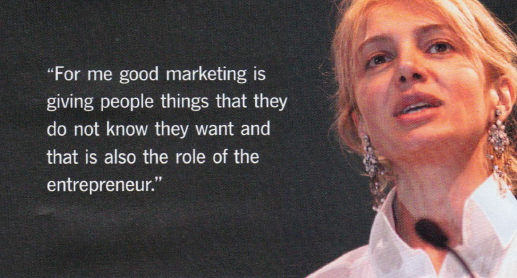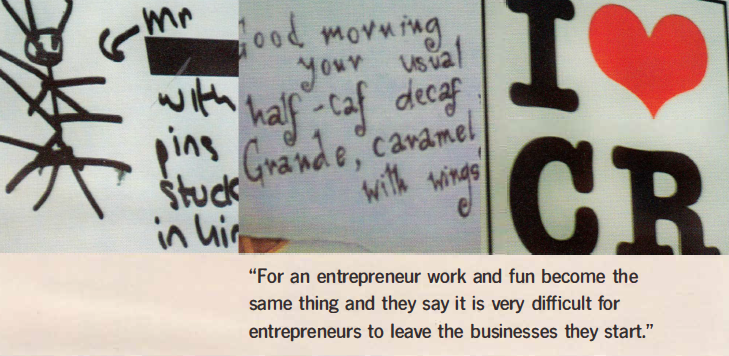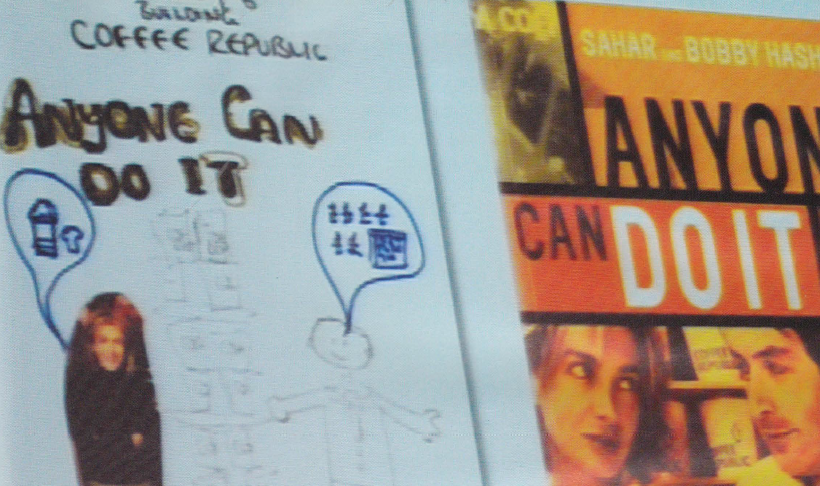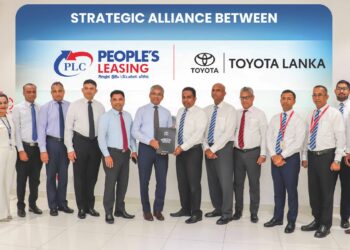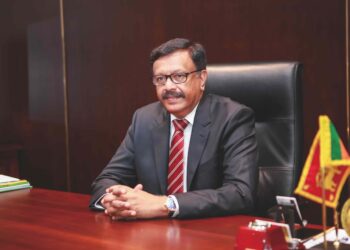In 1995, Sahar Hashemi, together with her brother Bobby, founded Coffee Republic. It soon became one of the UK’s most recognized high street brands. Sahar gave up her professional career as a lawyer and staked everything on a dream and projected the Coffee Republic into the coffee revolution that transformed a nation of tea drinkers into one obsessed with triple decaf half-caf lattes.
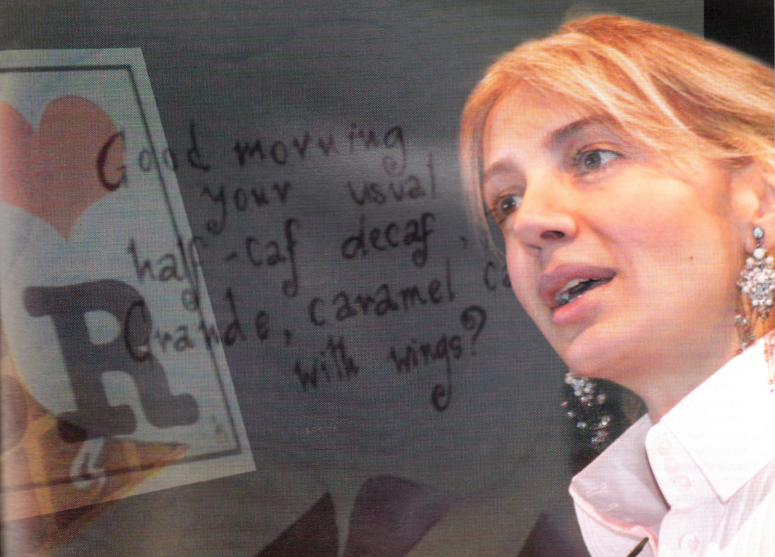
This is a personal story of change. A personal story of how I built a brand. Change is what entrepreneurship is about, entrepreneurs are known as agents of change, we live in a world full of change and I am here as an entrepreneur to tell you about that. I believe that every single person has the qualities within them and can be an entrepreneur. The biggest problem they have is that when people mention the word ‘entrepreneur,’ most of us say I am not the ‘entrepreneurial’ type, ‘I have not got it in me.’ This is a myth I want to dispel, because I think that everyone has an entrepreneur locked within them. However creative you are, change is difficult and therefore that entrepreneurial side of you becomes more difficult to switch on. I never thought I was a typical entrepreneur. In fact if you told me eleven years ago I would stand before you as an entrepreneur, I would have never ever believed you. When I was growing up in the UK we had just one idea of what an entrepreneur was and that was Richard Branson. I would always compare myself to Richard Branson and think there is no way I am like Richard Branson. I didn’t make my first million selling sweets in the school playground, and like Richard Branson I did not drop out of school in a controversial way. Richard Branson makes you feel that unless you dropped out of school you are a complete loser and you have no creative or entrepreneurial skill whatsoever. So I never ever thought I had it within me, therefore I went and became the opposite of entrepreneur,
I became a lawyer. I qualified and joined a big city law firm and I soon realised that I made a terrible decision in my life, that I had chosen completely the wrong career for myself. Because what I believe now is who you are and what you do should become the same thing. So ideally your career should be suited to your personality and I realised that being a lawyer did not suit my personality at all. There are two things going for me: one is my optimism, the other my enthusiasm. Very quickly, I realised that optimism and enthusiasm were the two qualities I did not need to be a good lawyer. They were two superfluous qualities of a lawyer. I realised I could no longer be myself, every morning left 40% of myself at home and I took only 60% of myself to work. I often imagined how it would feel if I took a 100% of myself to work. I believe that when you stop taking a 100% of yourself to work, every morning when you go to the office something switches off inside and you take home what I call a ‘switched off, mindless, state of mind’ exactly the opposite of the entrepreneurial state of mind, and when you take on that state of mind you stop having fun at work. I was not having fun, I would tell my colleagues ‘What’s wrong with this picture, why can’t we have fun in what we do? ‘ The answer was ‘Well Sahar they are not paying you to enjoy yourself.’ I kept thinking to myself ‘Why can’t work be fun?’ because that was always the dream I was going for. I stayed at the law firm for five years, every morning just selling my soul and not living my dream. Why did I stay? Because I was in my ‘comfort zone’ and when you are in the comfort zone you are stuck in a rut. It is very difficult to move after placing yourself comfortably in the comfort zone. One of the lessons I have learnt, is that when you are in a comfort zone you have to go out there and you have to proactively make a change. Because if you do not proactively make that change, something dreadful always happens anyway to force the change upon you. So you have to go and make change happen.
As they say adversity breeds creativity and this is unfortunate but you should always start ‘changing before something dreadful happens. I was stuck in the comfort zone and could not make this change, I found it very difficult to change, very difficult to make some sort of move and sure enough, I got my wake up call. You always get some sort of call to wake you up and mine came in the form of adversity. I come from a very close family of four and in January 1993 my father died overnight of a stroke. He was Mr Comfort Zone, he was Mr Healthy. Him dying overnight was a real shock to me, the next morning I thought to myself ‘you know what, there is no comfort zone.’ For any of us to even remotely think that we are in a comfort zone is a complete illusion, comfort zones are a complete false sense of security. We have to make it happen and I thought that I have to make my dream happen. So I took a leap out of my comfort zone. My motto in life is: leap and a net will appear. I took such a leap and I realised the net was actually there.
The Coffee Republic story is the story of my leap, just to prove to you that once you jump the net is there. I left the law firm and went to live with my brother Bobby in 1994, who was four year older than me and was working in New York as a banker. This was because I just decided I would take some time off. When I arrived in New York very early in the morning, I was thinking ‘I must get a cup of coffee.’ Back then America was known for horrible coffee, even us in the UK used to make fun of American coffee, it was that bad. So I was looking for this diner with bottomless cups of brown liquid and as I walked down Madison Avenue I came across the new style coffee bars. This was in fact before Starbucks came to New York. I could not believe how they had turned coffee drinking, something very ordinary, something I associated with the office coffee machine. They had turned it into an amazing way to start your day, I went to order my drink and realised they had four different kinds of milk and for me being a woman and always on some kind of diet, having skinny lattes was amazing. There were also different kinds of muffins and I fell in love with all of it. I fell in love with it as a customer, like how every time you go on holiday you take on new habits and so I fell in love with this habit. Not thinking anything of it, I came back to London and I was sitting in a Thai restaurant with my brother and I just mentioned to him that I really missed the New York style coffee bars. I wish we had them in London so I could leave the house every morning and start my day in one of these wonderful coffee bars.
As soon as I said this, my brother got the business light bulb. He said, ‘You know what, we are going to make this idea into reality, I have heard of a company called Starbucks in Seattle which is going to be really big. Now that you have had this idea, you and I should be the ones to bring American style coffee bars to the UK.’ Upon hearing this, my reaction was ‘Hang on a minute, you got me completely wrong.’ I meant that someone else should open it and for me to go to it, which is how I meant it ‘as a customer.’ My brother was having none of it and he said if you do not want to do it at least do some research for me. So being a lawyer I quickly calculated my hourly rate and got a cheque off him just to do the research. I was still not at all convinced that I wanted to do it, and so off I went just because my brother was paying me.
The next day I got myself to the nearest tube station and got on the Circle line (the London tube line that travels across London in a circular route). I got off at every single stop to see what the coffee offer was like. The coffee offer was not good back then, you had these horrible greasy sandwich bars serving people disgusting coffee. That very night, when I came home, was the night I became an entrepreneur. I remember thinking it was the beginning of an idea and that it will work and we are going to go for it. My brother was going to leave banking and me the legal profession. I also remember one side of my brain saying ‘You have to go for it,’ and the inevitable chatter of the other side: ‘You must be missing something, you’re a lawyer, your brother is a banker. Why on earth would you guys open a coffee bar? You have no idea about this! Don’t do it – you are going to make fools of yourselves.’
I have now learnt in life that whenever you want to change there is always going to be that voice in your head and I have learnt to press the delete button. Because that is the voice that stops you moving forward. The next stage was the market research. One of the key problems for my brother and I was that we did not know anything about the world we were going into. We were clueless about coffee, retail and catering, we had absolutely no idea. I have a number of laws for being a successful entrepreneur and one of them is ‘the importance of being clueless.’ The beauty of entrepreneurs is that we have empty minds, we are usually clueless about what we are getting into, and because of this all we see is the vision, we do not see the obstacles. I think however creative you are, if you have been creative and successful for a long time you are not clueless enough. And you need a bit of clueless-ness in order to change. If you are not clueless, it means that your mind is contaminated by the ‘This is how we have always done it, it has worked for us before’ syndrome. Thus even your past successes make you less ‘clueless.’ I think there is a lot to be said about the clueless-ness of an entrepreneur. We were lucky as our minds were empty and uncontaminated by all the baggage and people in the coffee business, because all of them thought coffee bars would never ever work. Therefore market research for us became just one big fact-finding mission about coffee. People asked if we are going to do customer surveys? Well as an entrepreneur we do not really believe in doing customer surveys, mainly because we can’t afford them – and the other reason is that when you are changing and innovating there is no point asking customers what they want. Because sometimes customers restrict you to the status quo, whereas you are trying to anticipate their future needs.
For me, as an entrepreneur, someone who is an agent of change, don’t bother with customer surveys, because you’re anticipating a future where customers do not know what they want. When asked about customer surveys Henry Ford, the carmaker, simply replied: ‘If I would have asked my customers what they wanted, they would have said faster horses.’ For me good marketing is giving people things that they do not know they want and that is also the role of the entrepreneur.
As a lawyer, I am not very creative but I believe that everyone has creativity within them and it is just a case of bringing it out. I think when you have good input it’s hard to stop the flow of creative output.
I was very worried about the name and as I knew we were going to be on the high street it was important that we were to have a wild name. We just could not come up with a name, we ran through some random names including ‘Coffee 2000’ something my brother came up with. Even at the time of writing the business plan we did not have a proper name, it was referred to as ‘Java Express.’ One of my mottos in life is that ‘Anything worth doing is worth doing badly,’ so you might as well get on with it, do the first draft and get it right (perfect) eventually. After writing the business plan, we calculated that we would need to raise 90,000 pounds to open the first coffee bar. My brother was a banker so I thought he would be able to raise that in his sleep. In reality he had no idea and we went to this bookstore and ended up purchasing this book called ‘How to start a small business guide.’ In the ‘How to raise money’ chapter? Surprise, surprise! It said go to a bank. We ended up calling 40 bank managers in the UK and we got rejections from 20 of them, of the next 20 we got interviews with 19 bank managers. What we discovered is that every bank manager in the UK has his or her own discretion so if the Barclays branch manager on Fleet Street rejects you, then you can always try the Barclays down the Strand and so on. Success came down to how many bank managers you could stomach calling on in one day. The first 19 managers to whom we sold the business plan with passion said ‘There is no way we will give you a 90,000 pound loan, because this idea will never ever work.’
When we asked why it would not work, the bank manager said that it was obvious. (Not so to us!) ‘We are a nation of tea drinkers, what the hell are you doing bringing coffee to a nation of tea drinkers?
Well I had done my research and through it I had found that we were a nation of tea drinkers. In the 1980s we used to drink seven times more tea than we did coffee but by the time we hit the 1990s we were drinking four times more tea than we did coffee. As an entrepreneur this left me thinking that we had gone from drinking seven times more to four times more. There was my vision for change – and today we drink as much coffee as we do tea. This was not apparent to the bank managers, who are the enemies of innovation. They also said that terms like ‘half cat skinny lattes’ are American and will never wash in the UK. They said you will never get anyone paying more than 60 pence for a cappuccino.
The twentieth bank we visited was called Nat West and the branch was attached to the Royal Courts of Justice, and since I was a lawyer, I told my brother that this may be a good omen. We went to see the bank manager who appeared dusty, ash faced and pale and looked like someone out of a Dickens novel. He looked like he had never had a cup of coffee in his life, and all this in one of the smallest bank branches we had ever seen. His name was Mr Lindopp and halfway through my presentation he stopped me and said, ‘You know what, Sahar, just stop right there. I will give you the money.’ To this day I do not know why Mr Lindopp, the most unlikely bank manager, gave us the loan. The only explanation was that it was the end of the quarter and he had a loan quota to fill. This is when I learnt two things about entrepreneurship. Firstly people talk about creativity for entrepreneurs and creativity is not just about advertising and marketing for an entrepreneur, creativity is every single thing you do in the business. They say that 90% of start ups are financed by the guts, creativity and faith of the founders. So in entrepreneurship even when raising money, creativity plays a big role. Secondly when you start making a change, the whole world thinks you are an idiot cause you are making a change. By definition change is an act of creative destruction – you are destroying what has gone before and the whole world tells you not to do it. I have learnt that the only system and secret of success is that you need to notch up rejections.
When you are changing you need to expect 99% ‘No’ before you get to the ‘Yes.’ I believe in this system so strongly that whenever I do something new and I get a ‘Yes’ the first time around, I actually hate it because I know I am going to pay for it eventually. I urge you to notch up on the ‘No(s).’ To be entrepreneurial you should learn to never ever stop at a ‘No’ until you get to a ‘Yes.’ I believe that there is no dream that is not within your reach – and that much I can guarantee. The next step was implementation, and implementation and execution was a nightmare. We had to find a landlord and no one wanted to give us sites. We had to find suppliers and none of the suppliers wanted to supply us because we did not have any credibility. No employee even wanted to come and work for us. So we ended up bootstrapping, which to an entrepreneur means somehow getting by. What bootstrapping means to me is that ‘Money is a poor substitute for creativity.’ You cannot be creative by throwing money at something. The best way is to bootstrap. A good example is that when I couldn’t find the right muffin supplier I got them baked at home. I bought my cups from America, because you could not get cups like that in the UK. We wanted to have highly trained employees but we had no idea how to train employees and we didn’t have enough money to get good people to train them. So we stole our first employer from a-competitor who trained people really well. That’s what I call bootstrapping. The next step was to build a brand and I was clueless about marketing and branding at the time and I was thinking of going back to school and learning. In trying to read a few marketing books I came across a great quote by Phil Knight of Nike, who stated that ‘Marketing is just getting people to buy things.’ If that was the case, I am my own first customer. For me marketing is about converting customers and offering them value and with this sense of clueless-ness we opened the doors to the first Coffee Republic store. I believe good ideas can be copied and do not need to be new, original or revolutionary. Hence the store design was based on an American coffee bar.
We opened the store on the 4 November 1995, exactly one year after my brother had first proposed the idea. This was the first coffee bar of its kind in the UK and to give you an idea in the UK there are now over 2,500 coffee bars. So most people look at this, see it as a global brand and think that it was an overnight success. I have learnt in life that overnight successes are a complete myth. I believe that it takes 15 years to become an overnight success. To give you an idea what a disaster Coffee Republic was when it first opened, our break-even sales were 700 pounds. For the first six months every single day, we were only making 200 pounds of sales a day. This discounts my poor mother who popped in and had a cup of coffee five times a day. I also learnt that when you have new ideas customers will initially reject you. You have to convert them, one at a time. Many people told us that we had left our jobs to try and sell coffee to a tea drinking nation. For me this rang true, recalling the words of the bank managers. Perhaps we were lost.
Instead of giving up, we started working on Instead of giving up, we started working on Instead of giving up, we started working on the brand. Our budget did not stretch to allow us the luxury of a graphics company, so I paid 400 pounds for someone to do an illustration. What branding became to me, was that I was not going to be there to tell customers about Coffee Republic, so the brand name had to speak for me. This was a way of telling people that whatever your drink was, you could have your drink exactly the way you wanted it. I also wanted to highlight our New York Heritage. We ended up opening a training centre for the staff called ‘The Academy.’ We did not give up and it took exactly six months for sales to start creeping towards break even. We looked at each other and said ‘Coffee is going to be big, let’s grow it.’ The next year we opened one more store and I remember thinking ‘Wow – it is so exciting! We are a big chain now.’ Opening the second store was much more exciting when compared to any of its followers. The following year we opened seven stores and became a PLC company and had to hire a finance director. This was when we were still working from home, so we moved into an office. We then opened 30 shops. At that point, at the beginning of 1999, Starbucks entered the UK market. I was terrified because Starbucks came with a big advertising budget. It was a multi million-dollar company by the time it came to the UK. But what we had was a brand with a soul and a heart. That is a really good guarantee, as you begin a genuine dialogue with the customer and once this begins they will never ever leave you. It is a fantastic way to capture customer loyalty. With Starbucks entering the market we progressed to 110 stores, by which time I felt the company had changed character. I felt that I had gone from the kitchen table all the way back to the board room table, because when you have big organisational structures they play a big part in stifling creativity. I believe that systems of control are the enemy of creativity and change. The more experienced people we bought in, the out of the box thinking went out of the window.
The more people who came in, we became more ‘in the box’ and internally focused. For me a professional company is the opposite of a entrepreneurial company. When you become professional you join this corporate traffic jam and people are not ‘clueless’ enough. It was at this point that I thought it was time for me to leave. Entrepreneurs themselves have a natural sell by date. We had 110 stores, we were listed on the stock exchange and the value of the company was 50 million pounds with a 13 million pound turn over and I felt that my time was up. I thus sold my shares and left in 2001 I left lock, stock and barrel and I left thinking that this was a dream – to sell out and to not have to ever work again. It was only the next morning that I realised what a terrible mistake I had made. Because I have learned that the journey of change and the journey of entrepreneurship is not just about the money. It becomes a fantastic life journey where you discover part of yourself you did not even know you had. You discover qualities that can remain dormant all your life, if you don’t make the change.
The reason why most people become serial entrepreneurs is because there is work and the opposite is fun. For an entrepreneur work and fun become the same thing and they say it is very difficult for entrepreneurs to leave the businesses they start. It is akin to a bereavement and is very traumatic. After leaving the company, in the airport at Denver, Colorado, I was reading the Financial Times, which had broken the story that my brother and I had left the company. As I read the article I began to read my own story and I began in true entrepreneurial style to cry. The people around me must have been thinking ‘What can be so sad in the Financial Times.’ Change is a fantastic journey for an entrepreneur to go on. Since then I have written a book called ‘Anyone Can Do It,’ because I do believe that anyone can do it. I never thought I could write a book and I never thought I could start a business. It is only since I left Coffee Republic that I realised what it is about: every single person is an agent of change and can do it. Richard Branson is the exception. Entrepreneurs come in all shapes and sizes and everyone has an entrepreneur locked inside them. It is not about luck. I absolutely hate the word luck. I see a conveyor belt before each and every one of us and on this conveyer belt are tiny cubes of luck. If you have the wrong attitude, you are not even looking at the conveyor belt. You are too busy complaining and moaning. If you have the right attitude, you are looking closely at that conveyor belt so when that cube of luck pops in front of your eyes, you grab it. If you grab it, you’ve got to take the leap. If you take the leap, I guarantee that the net will always be there.
Sahar Hashemi at Speakers for Business, 1-2 Pudding Lane, London EC3R BAB Tel: +44 20 7929 5559, Email: sahar.hashemi@sfb.com Web: www.sfb.com
